|
Word Gems
exploring self-realization, sacred personhood, and full humanity
Editor's 1-Minute Essay:
Evidence
return to "Evidence" main-page
Sam Harris: “If someone doesn't value evidence, what evidence are you going to provide to prove that they should value it? If someone doesn’t value logic, what logical argument could you provide to show the importance of logic?”
Thomas Huxley: "The deepest sin against the human mind is to believe things without evidence. Science is simply common sense at its best - that is, rigidly accurate in observation, and merciless to fallacy in logic."
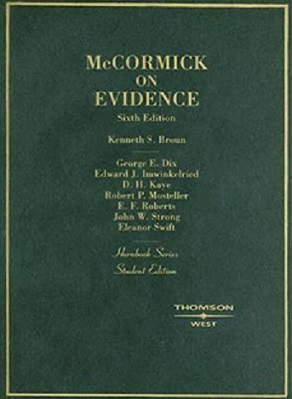
This writing will offer a survey, selected excerpts, from the respected McCormick On Evidence, containing well-established, fundamental, legal principle.
However, before we begin to explore basic rules of evidence...
|
Editor's prefatory comment:
Adrian Smith told me of a televised debate among university professors. All were against one individual.
He challenged his peers by speaking out against forms of egregious censorship. He said that to allow this oppression was to threaten our basic freedom of speech. If this kind of thought-control, demonization of rivals, and witch-hunt were to continue, if no one is able to express a contrary opinion, our very survival as a free society is threatened, in favor of a single, approved narrative handed down by power-and-control elites.
'The first speech censured, the first thought forbidden, the first freedom denied... chains us all, irrevocably.'
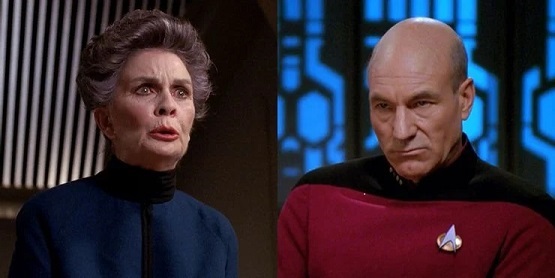
STNG, season 4, episode "The Drumhead"
He offered evidence, examples, of this infringement of civil liberties and asserted that we are now less free in the wake of this suppression of debate.
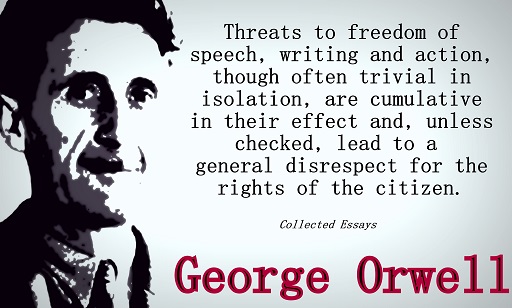
But this was too much for his totalitarian-minded colleagues. They didn’t want to talk about examples and evidence. They didn’t want logic and reason. Instead, what ensued was a mad-hatter free-for-all of personal attack and character assassination.
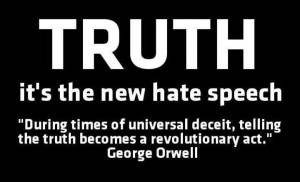
They said they were embarrassed to be on the same stage with him. They said they were disgusted with him and what he represented. They accused him of promoting hate-speech, racism, white-supremacist polices of the sort that had fostered slavery, and all unfairness to minorities.
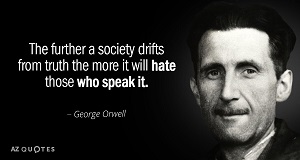
The so-called debate ended in chaos with the issues not being addressed.
Our civilization, with the freedoms we’ve enjoyed, cannot endure this dark-spirited verbal lynching. When the facts don’t matter, when haranguing replaces cogent answer, when a cabal of elitists presumes to rewrite history in favor of private agenda, when a self-righteous and checkered view of morality is imposed on others, then we cannot long survive without a new dark age, or civil war, engulfing us.
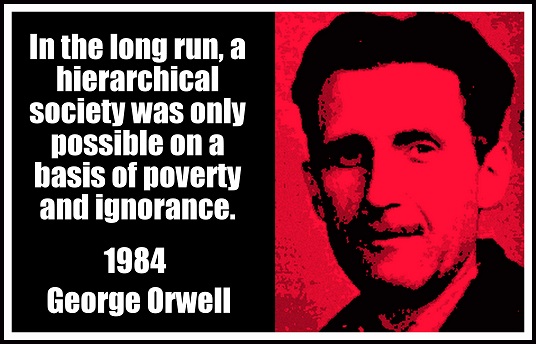
We were meant to weigh and consider new information as it comes to us; to hold loosely in our hands what we consider to be truth, pending new light, new data. And there will always be more to come, as the universe is filled with things of which we presently have no understanding.
But those who operate in the dark have no interest in promoting new knowledge, new discovery. Totalitarians serve private agendas of power-and-control, while wearing a mask of piety.
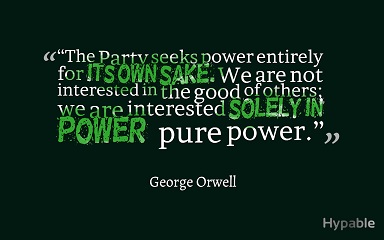
This brief writing will not change anything. But it's good to keep in mind a better way of thinking, of careful consideration of studied opinion, the views of rational others, in a fair and just manner; meaning, we must not lose our humanity in this present Orwellian oppression by dark forces.
All people of good-will long for a return to ordinary civility in society; it’s never been perfect, of course, but it’s the best the world has ever seen. Those who scoff at our traditions of reason and carefully weighing evidence do so to usurp power for themselves, leading us into bloody violence, one hate-filled group against another, as we witnessed in Central Europe some years ago.
Civilization is a fragile flower and easily wilts under the torrid heat of brown-shirt boorishness. Fanaticism, becoming more and more common now, as Diderot reminded us, is but a very short step to barbarism.
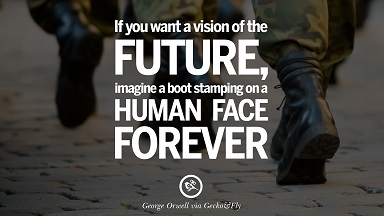
|
All quotations below, unless indicated otherwise, are from McCormick On Evidence:
The law of evidence is the system of rules and standards by which the admission of proof at the trial of a lawsuit is regulated.
The client must be interviewed to ascertain the facts, and these interviews should include a tactful but searching cross-examination to overcome the client’s natural tendency to confine the story favorable to himself.
|
Editor’s note: More and more today, rules of evidence - which constitute the essence of fairness - are ignored. Trials, effectively, are conducted in the media. Justice is replaced by self-serving agenda of those who control information services. These set themselves up as a kind of neo “infallible church” ruling on what is moral – with morality defined as whatever bolsters their political objectives.
Everything can be “debunked.” Mother Teresa can be debunked. Internet articles purport to “debunk” anything that stands in the way of political power-grabbing. See this writing by Dan Drasin on the psychology of “debunking” and its often perverted sense of justice.
|
The witnesses who have firsthand knowledge of the transaction in controversy must likewise be interviewed, and where possible, their statements taken.
Apart from the ordinary eyewitnesses, it is increasingly necessary to arrange for the employment of technical experts… physicians, chemists, engineers [according to the nature of the controversy].
If pertinent, scientific evidence must be prepared…
|
Editor’s note: A “kangaroo court” is a mock court, a "show trial," providing a veneer of legal process. In this perversion of justice, a predetermined outcome is levied in favor of designated vested interests.
Rules of evidence have a long history. They reach back many hundreds of years, codified as English common law. Not created in a vacuum, each of these rules speaks to some historical injustice; typically, a monarch ruling by whim, ignoring evidence, trampling on due process and human rights, all in support of power-and-control designs.
|
From the "clear thinking" page:
|
#14 'there is no proof'
Very often we hear the defense, the accusation, “there is no proof.” The country may be reeling with the loss of personal freedoms, corruption at the highest levels, the rule of law sullied, but totalitarians join hands to chant “there is no proof” of problems of any kind.
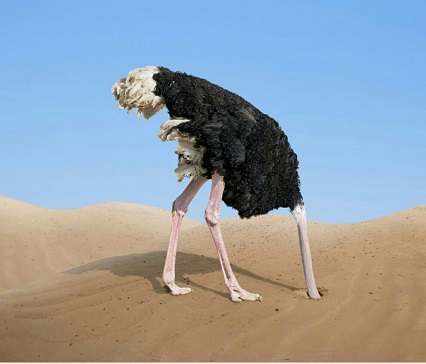
We see this disingenuity at work, not just in politics and civil government, but in despotic religion, in materialistic science, in rapacious corporate policies; and, of course, in common conversation.
“There is no proof” that we are wrong, is to be translated as, “There is no proof” which we will accept or confess to.
Here’s one small example, so prevalent in the arena of scientific evidence for the afterlife:
A room filled with a battery of electronic sensing devices, monitoring every nuance of motion, heat, and sound, but the evidence is summarily rejected by radical skeptics.
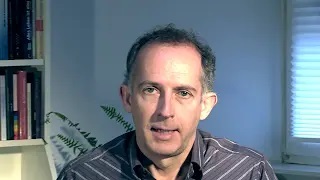
Professor Eckhard Kruse reports of his investigations of physical mediumship. In an effort to preempt radical skeptics’ immediate charges of fraud, Professor Kruse employed an impenetrable array of high-tech electronic equipment.
READ MORE
Despite these sensing devices registering the slightest variation of movement or energy, those intent upon obfuscation immediately hide behind "there is no proof" for the afterlife. See further discussion on this topic here.
there may be no proof, but there might be very good evidence
Tom Campbell pointed out that the term proof is best left to describe grades of whiskey. This so because we can never arrive at proof, a final word of authentication, on anything. No matter the subject, it is always possible to gainsay, to raise objection, to doubt – anything.
And even when we personally are involved in a veridical process, our own senses can deceive us. We might believe that we saw or heard something, but we could be mistaken; which is why eye-witnesses to almost any event will offer differing accounts. It’s possible to deny anything - which is why, even in Summerland, there is debate on the existence of God or even that a place named Earth is real.
instead of proof, we should be talking about degrees of evidence
Mortimer Adler outlines the major categories of “the realm of doubt”:
A judgment belongs in the realm of certitude when it is of the sort that
(1) cannot be challenged by the consideration of new evidence that results from additional or improved observations, nor
(2) can it be criticized by improved reasoning or the detection of inadequacies or errors in the reasoning we have done. Beyond challenge or criticism, such judgments are indubitable, or beyond doubt.
In contrast, a judgment is subject to doubt if there is any possibility at all
(1) of its being challenged in the light of additional or more accurate observations or
(2) of its being criticized on the basis of more cogent or more comprehensive reasoning…
In criminal prosecutions, the degree of proof required is defined as being “beyond a reasonable doubt." But this does not take the verdict rendered by the jury out of the realm of doubt.
there may be no proof, but there might be very good evidence from which the unprejudiced mind will draw reasonable inference
What the jury is asked to bring in is a verdict that they have no reason to doubt—no rational basis for doubting—in the light of all the evidence offered and the arguments presented by opposing counsel.
It always remains possible that new evidence may be forthcoming and, if that occurs, the case may be reopened and a new trial may result in a different verdict…
In civil litigation, the degree of proof required is defined as being "by a preponderance of the evidence." Here the jury's verdict claims no more than that the answer it gives to a question of fact has greater probability than the opposite answer. As the jurors have interpreted and weighed the evidence, they have found that it tends to favor one answer rather than another…
In a wide variety of daily affairs—in the conduct of family life, in the care of our bodies and in all matters of health and disease, in our business or professional careers, in our financial
dealings, especially in making investments, in our political decisions, especially with regard to foreign policy and international relations—we frequently act on judgments that are not beyond a reasonable doubt, but are simply more probable than their opposites.
if it walks like a duck, quacks like a duck…
In political debates, or with religious doctrinal disputes, or even concerning Amazon book reviews of controversial topics, we find purple-faced and apoplectic combatants charging “there is no proof for that.”
And it’s true, there may be no proof, no final world of authenticity to take the subject out of the realm of doubt, but there could be a great deal of supporting, corroborating or background evidence which makes one verdict much more probable than another.
we're suspicious that it's a duck
All of which is to say that, there may be no absolute proof for the existence of a duck, but if it walks like a duck, quacks like a duck, smells like a duck, swims like a duck, was seen in the vicinity of ducks congregating, was reported to affiliate with known ducks, then there’s a high degree of probability, to be ascribed by reasonable jurors, that we are in fact looking at a member of the Anatidae family.

I say, among 'reasonable' jurors
But, of course, all this discussion is far too high-minded for those who care nothing for the truth.
Upton Sinclair, I, Candidate for Governor: “It is difficult to get a man to understand something when his salary depends on his not understanding it.”
Along with salary, people are paid with psychological perks of acceptance, a sense of safety, and “becoming someone.” So much of what people profess has nothing to do with finding the truth but issues in support of some Dear Leader, some holy cause, some true-believer doctrine.
And, for these, no degree of evidence will ever be convincing.
|
Editor’s note: The following is an excerpt from the “Editor’s Last Word” for afterlife item #54, D.D. Home, arguably, the greatest psychic-sensitive of all time. Therein, I pointed out how Home, all of his working life, had been unfairly condemned by the British press and Big Religion in their kangaroo-court ways. Concerning the subject of evidence, I presented this:
|
But let's revisit two quotations above:
Professor Challis: "Either the facts must be admitted to be such as are reported, or the possibility of certifying facts by human testimony must be given up."
Captain Wynne: "If you are not to believe the corroborative evidence of three unimpeached witnesses, there would be an end to all justice and courts of law."
Consider the implicit skewed logic, violations of clear thinking, offered by the press and religion:
If we cannot accept the corroborating evidential testimony of “unimpeached” witnesses, by the scores and hundreds, some with world-class professional skills to judge competently; if all this deposition of affirmation is but “humbug” and “twaddle”, “fraud” and “imposture”, then why should we believe a word that you say? In other words, they would set aside the validity of time-honored jurisprudence concerning rules of evidence when others speak, but then expect to be taken seriously in their rebuttals just because it’s from them. This scheme works well in a totalitarian state but not among those who honor best methods of ascertaining the truth.
|
Dorothy Sayers, Gaudy Night: "The proportion and relations of things are just as much facts as the things themselves; and if you get those wrong, you falsify the picture really seriously."
'give me one example, let's talk about it'
hiding in vague and undefined aspersion
Sir Arthur Quiller-Couch (1863-1944), On The Art Of Reading: "A very well-informed person is an object of terror."
The last thing the power-and-control crowd wants is a real fact-centered discussion of the issues as this would expose their Machiavellian ways. Much better, they scheme, to unwarrantedly charge “misinformation” and attempt to poison public opinion with an empty claim of “someone, somewhere disagrees with you.” The way to pop this balloon of scurrilous charge is to politely demand, “Give me one example. Let’s talk about it.” This is excellent. "Misformation"? - fine, then "give me one example, let's talk about." But talking about it, debating with an articulate, fact-possessing opponent, is precisely what they do not want to do.
When cornered, the unscrupulous and conniving will say anything to save face and maintain their ways of oppression. It's part of the play-book of "The Lying Teacher." And they will call-to-witness their “experts” which are nothing more than aligned interests, bought and paid for, by those seeking to bilk the public of their human rights.
|
The following is from a chapter “What Constitutes Evidence?” in the book “Man Is A Spirit” (1918) by J. Arthur Hill:
In the autumn of 1915, when the casualty lists
[from WWI] were terribly lengthening, the Editor of the
International Psychic Gazette asked a number
of eminent men to send, if possible, "messages of
comfort to the bereaved" for publication. Many
helpful replies were received from men who, on
one ground or another, believed in the survival
of personality past death; but the most striking,
to me, was the response of Mr. Edward Clodd.
He said : "As the evidence that we possess seems
to me conclusive against survival after death, I
can say nothing on the lines which you sug-
gest." (October issue of the Gazette, p. 6.)
We can hardly doubt that it must give pain to any-
one to make a statement like that, for it would
strike a chill to the heart of any mourner; and it is permissible to suppose that Mr. Clodd regretted his negative convictions. I wish to suggest that it is not necessary to hold them;
that they are the result, not of evidence
against, but of non-acquaintance with evidence
for, or of materialistic prejudice. Hume said
that miracles were contrary to experience;
but he meant only that they were contraiy to
his own and that of those whose testimony he
believed; which proves nothing, for there are
others.
The evidence, we are told, seems conclusive
against survival. The obvious question at once
arises: "What evidence?" Mr. Clodd gives
none. And indeed for a very good reason;
namely, that there is none to give. There can be
no evidence that there is no such thing as a white
crow; even if there is no record of anybody see-
ing one, this furnishes ground for a provisional
judgment only, for at any moment a white crow
may turn up.

Editor's note: One white crow or one black swan:
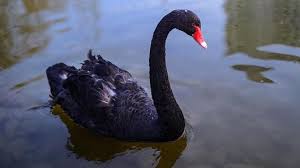
And in the matter of survival, there are a few millions of people in the world who have seen their white crow. Mrs. Piper was Professor James's. One piece of positive evidence shatters a negative presumption. One white crow disproves the proposition that all crows are black. One piece of spiritualistic evidence suffices at least to throw doubt on the negative presumption against survival.
This presumption is based on ignorance or prejudice,
not on knowledge; as with a cleric known to me who "could see no evidence for evolution." He did not want to see it. The ostrich was supposed to persuade itself that it had no pursuers by hiding its head in the sand. The existence of white crows can be disposed of if we decline to look at them. Spiritistic evidence can be ignored, as indeed, it generally is. 'It is magnificent, but it is not war," said the French General, watching the charge at Balaclava: the audacity of ignoring psychical evidence is similarly magnificent, but it is not science [they say].
Editor’s note: See the footnote below which offers historical perspective to the French general’s comment.
It is not even fair-minded common sense. We cheerfully ad-
mit that it is possible to advance several differ-
ent and more or less reasonable hypotheses in
explanation of the phenomena, without invok-
ing spirits; but the existence and significance of
these phenomena can hardly be ignored much
longer. There is room for differing interpreta-
tions, but it will soon have to be recognized that
there is something there to be interpreted. The
negative dogmatizer is approaching extinction.
Mr. Clodd belongs with von Helmholtz, whose
words we now read with amusement. He once
said to Sir William Barrett that ''neither the
testimony of all the Fellows of the Royal So-
ciety nor the evidence of his own senses would
lead him to believe even in thought-transference,
as it was impossible." The experts were once
equally sure that it was impossible for trains to
run at the appalling speed of thirty miles an
hour. And I am pretty sure that my grand-
father would never have believed in wireless
telegraphy.
But, putting aside mere ignorant prejudice,
we may well ask why psychical evidence, though
now obtaining serious recognition, is still looked
on with some distrust and doubt; and I think-
there is a reasonable explanation and a reason-
able cause of this. A large amount of evidence,
particularly in recent publications, has been ob-
tained through mediums, sometimes paid ones;
and there is a natural tendency to regard such
people as rogues until they are proved honest,
and even afterwards. I sympathize with this,
though it is mistaken in its over-cautiousness.
Palmists and fortune-tellers are mostly or en-
tirely frauds; but such people are not mediums.
Of this latter class I believe the majority to be
perfectly honest, though there is much self-de-
lusion and erratic faculty. But it is certainly
very desirable that evidence of this character
should be supplemented by other evidence which
is above all suspicion of dishonesty. Of course
many of us are acquainted with private sensitives
or mediums through whom is often obtained evi-
dence even stronger than the best given by pro-
fessionals; but it is usually private matter, and
the sensitive, moreover, is under no obligation
to take the world into his or her confidence.
Mr. Clodd's ignorance of the existence of such per-
sons is shown in a letter of his, dated December
31, 1916, to the Yorkshire Post: "I am tempted
to ask whether communications from the departed
are to be had only by payments to professional
mediums." Evidently he doesn't know, and the
tone of the letter suggests that he considers his
question a knock-out — which is rather amusing
to those who do know. It is unfortunate that
Mr. Clodd, by the vigorous "rationalist" writings which so plainly show his prejudice, should close up the channels through which information might come to him. People naturally will not tell him things which they know would be
received with derision instead of scientific and
open-minded consideration.
But apart from private mediums who get com-
munications more or less regularly, there are
many individuals who enjoy evidential but only
occasional enlargements of perceptivity. From
time to time during the last twelve years I have
received from such persons accounts of spon-
taneous psychical experiences of many kinds,
from dreams which only just touch the fringe
of the supernormal up to full-blown apparitions
seen by several people...
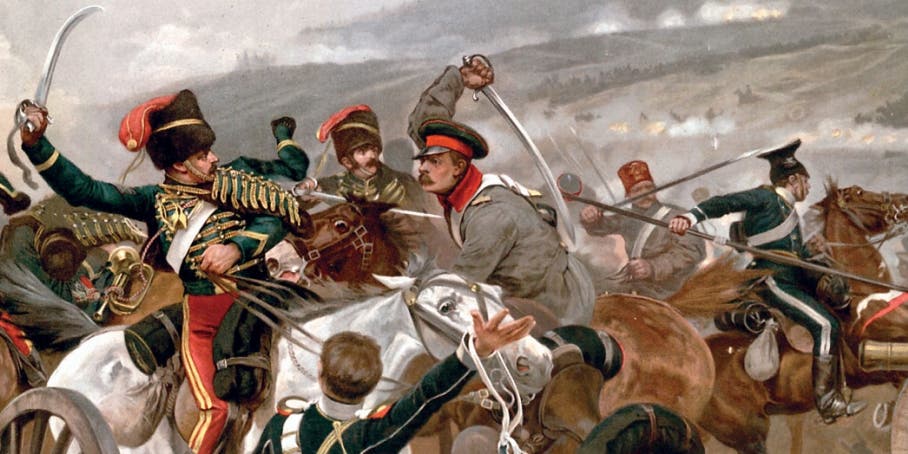
Footnote: History.com called it the “most celebrated cavalry charge,” the charge at Balaclava, part of the Crimean War with 500,000 slain. Tennyson immortalized this bloody event with his “Charge Of The Light Brigade.”
It seems that author J. Arthur Hill found the French general’s assessment of the carnage “it is not war” as convincing as the materialists who profess “psychic evidence is not science.”
The following is from History.com:
A major conflict of the 19th century, the Crimean War claimed at least 500,000 lives and had a profound impact on such renowned personalities as British nurse Florence Nightingale and Russian author Leo Tolstoy. It got its start in and around Jerusalem, then part of the Ottoman Empire, where Orthodox Christian and Catholic monks had been engaging in fierce, sometimes deadly brawls for years over who would control various holy sites. Following one such violent squabble in 1852, Czar Nicholas I of Russia, a self-proclaimed defender of Orthodox Christianity, demanded the right to exercise protection over the Ottoman Empire’s millions of Christian subjects. Upon being rejected, he then sent his army, the largest in the world, to occupy two Ottoman principalities in present-day Romania. The czar also purportedly had his eyes on Constantinople, the Ottoman capital, which if taken would give his navy unfettered access to the Mediterranean Sea. Unnerved by this expansionism, Britain and France sent their own warships to the area and vowed to defend Ottoman sovereignty.
Fighting officially broke out in October 1853, and the following month the Russians decimated the Ottoman fleet in a surprise attack. But although Nicholas referred to the declining Ottoman Empire as the “sick man of Europe,” his land forces made little progress in their push south, underscored by the failed siege of a fortress in present-day Bulgaria. Meanwhile, in March 1854, Britain and France declared war and immediately bombarded the then-Russian city of Odessa. With Austria likewise threatening to jump into the fray, Nicholas withdrew from Romania. Rather than declare victory, however, Britain and France decided to punitively target the Russian naval base in Sevastopol, located on the Crimean Peninsula. On September 13, 1854, a joint allied force of over 60,000 troops sailed into Kalamita Bay, about 33 miles north of their objective. Due to stormy weather, it took five days for them to fully disembark. Believing the conflict would be over quickly, they brought neither winter clothing nor medical supplies. They moreover lacked accurate maps, had little idea how many Russian troops opposed them and flouted the dietary restrictions of the Muslim Ottoman soldiers within their ranks. To make matters worse, a cholera outbreak erupted.
Nonetheless, the British and French defeated the Russians in their first run-in near the Alma River, causing a panicked retreat with the help of their long-range Minié rifles. They then commenced a roundabout march to Sevastopol, where they spent two-and-a-half weeks digging trenches and lugging artillery into position prior to initiating a bombardment of the city on October 17. By that time, however, the Russians had significantly strengthened their defenses. After holding out for eight days, they tried to break the siege with a dawn attack on Britain’s supply base in the nearby fishing village of Balaclava. That morning, having forced Ottoman troops to abandon four defensive redoubts, they were able to occupy the Causeway Heights just outside town. But they failed to progress any further thanks to a regiment of Scottish highlanders and the Heavy Brigade, each of which repelled a Russian advance.
With Balaclava now safe, Lord Fitzroy Somerset Raglan, the British commander-in-chief in Crimea, turned his attention back to the Causeway Heights, where he believed the Russians were attempting to make off with some of his artillery guns. He ordered the cavalry, consisting of both the Heavy and Light brigades, to advance with infantry support “and take advantage of any opportunity to recover” the lost ground. Lord Raglan expected the cavalrymen to move immediately, with the infantry to come later. But George Bingham, the earl of Lucan, who commanded the cavalry, thought he wanted them to attack together. As a result, Lucan’s men sat around for 45 minutes waiting for the infantry to arrive. At that point, Raglan issued a new order, telling the cavalry to “advance rapidly to the front … and try to prevent the enemy carrying away the guns.” From his vantage point, however, Lucan could not see any guns being removed. Confused, he asked Raglan’s aide-de-camp where to attack, but instead of pointing to the Causeway Heights, the aide allegedly waved his arm in the direction of a Russian artillery battery at the far end of an exposed valley.
Lucan next approached his brother-in-law James Brudenell, the earl of Cardigan, who commanded the Light Brigade. The two men loathed each other so much they were barely on speaking terms. And neither was apparently respected by the troops. One officer in the Light Brigade went so far as to call them both “fools.” Cardigan, he wrote in a letter home, “has as much brains as my boot. He is only equaled in want of intellect by his relation the earl of Lucan.” Though perturbed by Raglan’s order, Lucan and Cardigan obeyed it without first checking back in to make sure they understood it correctly. At their bidding, the roughly 670 members of the Light Brigade drew their sabres and lances and began their infamous mile-and-a-quarter-long charge with Russians shooting at them from three directions (though never from all three at once). The first man to fall was Raglan’s aide-de-camp. Another soldier then had “his head clean carried off by a round shot, yet for about 30 yards further the headless body kept in the saddle,” according to a survivor. Other survivors spoke of being splattered with horse blood, of watching their companions lose limbs, of seeing brains on the ground and of going through smoke so thick it was like “riding into the mouth of a volcano.”
The Heavy Brigade, which, its name notwithstanding, resembled the Light Brigade except with regard to uniform color, was supposed to follow in support but only went a short way down the valley before Lucan directed it to turn back. Somehow, the Light Brigade reached its destination anyway, crashing into the enemy lines with a vengeance. A few Russians even shot at their own comrades in a desperate bid to clear an escape route. The Light Brigade’s members didn’t hold the ground for long, though, before being forced to stagger back from whence they came. En route, Russian artillery pounded away again from the Causeway Heights—but not from the other two sides, as the Light Brigade had taken out one battery itself and the French had taken out another—while Russian cavalrymen attempted to entrap them. In the end, of the roughly 670 Light Brigade soldiers, about 110 were killed and 160 were wounded, a 40 percent casualty rate. They also lost approximately 375 horses.
Despite failing to overrun Balaclava, the Russians claimed victory in the battle, parading their captured artillery guns through Sevastopol. Yet they would surrender the city and naval base nearly a year later, after which they agreed to give up a small chunk of territory and to keep their warships out of the Black Sea in exchange for peace. Meanwhile, the Light Brigade’s exploits had already become legendary in Britain, thanks largely to Alfred Tennyson’s poem “The Charge of the Light Brigade.” Named poet laureate a few years earlier by Queen Victoria, he praised the bravery of the men as they rode into the “valley of death.” His poem “The Charge of the Heavy Brigade at Balaclava,” on the other hand, never quite captured the public’s imagination.
|
reprinted from the "afterlife" page:
"There is a great body of evidence which, taken as a whole, absolutely and unqualifiedly proves the case for the afterlife... This evidence would be technically admissible in the Supreme Court of the United States, the House of Lords in England, the High Court of Australia, and in every civilized legal jurisdiction around the world." Victor Zammit, retired attorney of the Supreme Court of Australia
|
Editor’s note: “Taken as a whole,” facts in aggregate, a total-field perception, becomes key to determining better views of reality.
|
Dr. F.C.S. Schiller: "A mind unwilling to believe, or even undesirous to be instructed, our weightiest evidence must ever fail to impress. It will insist on taking the evidence in bits and rejecting item by item. The man who announces his intention of waiting until a single absolutely conclusive bit of evidence turns up, is really a man not open to conviction... For modern logic has made it plain that single facts can never be 'proved' except by their coherence in a system. But, as all the facts come singly, anyone who dismisses them one by one is destroying the conditions under which the conviction of new truth could ever arise in his mind."
|
To insist on waiting for a knock-out blow of one conclusive item of data is to declare, with sophism, that “extraordinary claims require extraordinary evidence”. This is tantamount to announcing, from the outset, that the new proposition shall not be accepted, and detractors work hard to ensure rejection. Painting the target around the arrow, they begin with conclusion in mind.

There can never be absolutely conclusive “extraordinary evidence”. We always know but in part. All perceptions are fragmentary, all data might be gainsaid, no matter how auspicious. It is disingenuous to assert, "it's not extraordinary enough" - it will never be enough, especially for the willfully blinded. This is not science but cultish "scientism" (see below).
Instead, the honest seeker of truth, with disinterest, will survey the data, in its totality, gathered from independent sources, weighed proportionately, empirically corroborated variously, measured against competing theories, over a period of time.
In this manner of objective research, often slowly with false starts and mirages of success, a clearer and more accurate picture of the world as it is - not as fears or vested inclinations clamor - gradually, and finally, comes into view.
A new scientific truth does not triumph by convincing its opponents, making them see the light, but rather opponents eventually die and a new generation grows... rarely, does Saul become Paul.” Max Planck, father of quantum mechanics - Editor’s note: Planck’s dictum is often paraphrased as “science progresses one funeral at a time.”
What do you [Kepler] think of the foremost philosophers of this university? … they have refused to look at the planets or moon or my telescope ... the authority of a thousand is not worth the humble reasoning of a single individual. Galileo
The years of searching in the dark for a truth that one feels but cannot express, the intense desire, the alternations of confidence and misgiving, until one breaks through to clarity, are known only to those who have themselves experienced them. Einstein
New scientific ideas never spring from a communal body, but from an inspired researcher, struggling [if need be, for years] in lonely thought on one single point. Max Planck
If anyone advances anything new which contradicts, perhaps threatens to overturn, the creed which we have for years repeated, and have handed down to others, all passions are raised against him, and every effort is made to crush him. People resist with all their might; they act as if they neither heard nor could comprehend; they speak of the new view with contempt, as if it were not worth the trouble of even so much as an investigation or a regard, and thus a new truth may wait a long time before it can make its way... I venture to assert that any fair-minded person who devotes to its careful and dispassionate investigation as many days, or even hours, as some of us have given years, will find it impossible to continue sitting in the seat of the scornful. Sir William Barrett, physics professor, “On The Threshold Of The Unseen”, concerning psychic phenomena
|
cumulation of probabilities
Sir William Barrett, “On The Threshold of the Unseen”: “Those who remain in doubt as to the value of the evidence adduced in [a disputed matter] should remember that it is, and probably always will be, impossible to obtain such conclusive logical demonstration of survival after death as will satisfy every agnostic. But ‘formal logical sequence’ as Cardinal Newman said in his 'Grammar of Assent,’ ‘is not, in fact, the method by which we are enabled to become certain of what is concrete... . The real and necessary method... is the cumulation of probabilities, independent of each other, arising out of the nature and circumstances of the particular case which is under review,’ and so the truth of the spirit hypothesis, and of spirit-identity, like the truth of all disputed matters, is to be judged in this way, -- that is, by the whole evidence taken together... Kant knew nothing of the telepathy or psychical research, but even his critical mind admitted that ‘in regard to ghost stories, while I doubt any one of them, still I have a certain faith in the whole of them taken together.’ — Dreams of a Spirit Seer, p. 88."
Editor’s note: The veridical nature of Barrett’s assertion here cannot be emphasized too much. Disingenuous opposition will ever seek to dismiss evidence, one proposition at a time, thereby creating an illusion of fair treatment. But, as Barrett and others have pointed out, it’s never possible to present piece-meal evidence “as will satisfy every agnostic”; especially when they declare from the outset that they cannot be satisfied. Instead, “the real and necessary method” by which truth shall be established “is the cumulation of probabilities,” arising both from independent sources and from the nature and circumstances of a particular case. For example, on the “evolution” page, Darwinism is altogether defeated by the mathematics -- with a demonstration that “the cumulation of probabilities” would require a duration of time far longer than the entire life of the cosmos, or several of them. This is a correct and potent method by which the truth of almost any question might be judged, “that is, by the whole evidence taken together.”
|
Oxford professor of philosophy, Antony Flew, 'the most famous atheist in the world,' changed his mind
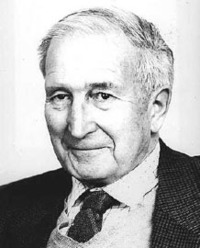
Antony Flew (1923-2010)
There are many articles featuring Flew’s new understanding. Here is one of them: https://www.bethinking.org/does-god-exist/a-change-of-mind-for-antony-flew
In the professor's own words:
“I now believe there is a God...I now think it [the evidence] does point to a creative Intelligence almost entirely because of the DNA investigations. What I think the DNA material has done is that it has shown, by the almost unbelievable complexity of the arrangements which are needed to produce life, that intelligence must have been involved in getting these extraordinarily diverse elements to work together.”
“Science spotlights three dimensions of nature that point to God. The first is the fact that nature obeys laws. The second is the dimension of life, of intelligently organized and purpose-driven beings, which arose from matter. The third is the very existence of nature.”
“If you had an equation detailing the probability of something emerging from a vacuum, you would still have to ask why that equation applies. Hawking had, in fact, noted the need for a creative factor to breathe fire into the equations.”
Breathing fire into the equations is an extremely important point. In other words, even if Darwinism were granted as much time as desired, even a span of years exceeding the duration of the universe by trillions of times, yet, in all that immensity, no life would be produced. It takes more than time to produce life; it takes some First Cause to have breathed fire into the equations.
Editor’s note: What finally convinced the professor? His reasoning is not complicated, in that, as he suggests, nature is far too complicated, an “unbelievable complexity of the arrangements,” to have arisen by randomness; of necessity, there must have been some sort of First Cause. This assessment is but alternate verbiage concerning what many other thinkers have asserted, the need to consider “the cumulation of probabilities,” that “single facts can never be 'proved' except by their coherence in a system,” or that truth will be determined by “the whole evidence taken together.”
Editor’s note: Top computer scientist, Frederico Faggin, inventor of the world’s first computer chip in 1971, also speaks out against dogmatic materialism. In recent interviews, he has repeatedly stated, to the effect: “We have Nobel laureates saying that the universe is meaningless, that nature itself is absurd. Is this logical? The universe and nature were the forerunners, producing us. This would make humans absurd. Or is the preaching Nobel laureate absurd? Modern materialistic science places high faith in chance and randomness as causal factors leading all that we see around us. And yet these same scientists also have great regard for the intricate beauty and complexity of mathematics, and they would be the first to remind us that mathematics reveals a hidden reality, that equations outline the ontology of the material world. Fair enough, but if mathematics draws the veil from the inner workings of physicality, which, they say, is intrinsically random and chaotic, how would this be possible when mathematics itself, the roadmap to physical reality, at its core, is highly structured, highly rule-based, the very essence of order and system? What are we to make of this farce, this self-blindness, an extremely selective viewing of the data, a disingenuous assessment of the nature of things?”
READ MORE
|
THIS PAGE IS UNDER CONSTRUCTION

|















